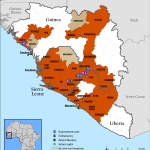Employee Travel Security: What to Know About the Ebola Virus Outbreak in Africa
Summary: Employee Travel Security, Africa, and the Ebola Virus
The most recent outbreak of the Ebola virus in West Africa has been the largest outbreak ever recorded. The virus has spread out of remote villages and killed over 2,000 people as of the date of this writing. Many observers are concerned that the outbreak will continue to spread, and several global health organizations admit that the disease has spread “out of control.” Given the scale of this particular outbreak, many companies are considering the potential impacts to employee travel security. IMG Group, a protective services provider, believes that some of the information below can assist organizations, as they weigh their employee travel security options.
-
What is Ebola?
 The Ebola virus is one of the world’s most deadly, with a mortality rate of up to 90%. Although the most recent outbreak of Ebola is the largest recorded, it is less deadly, with a mortality rate of only 60%. The virus is believed to have originally been an animal-borne virus that mutated and began infecting humans living in West-Central Africa. Although there is some debate on its origins, many believe that the virus first appeared among fruit bats. The virus works by attacking internal organs and tissues, causing clotting and bleeding. Death often results from a loss of blood and eventual organ failure.
The Ebola virus is one of the world’s most deadly, with a mortality rate of up to 90%. Although the most recent outbreak of Ebola is the largest recorded, it is less deadly, with a mortality rate of only 60%. The virus is believed to have originally been an animal-borne virus that mutated and began infecting humans living in West-Central Africa. Although there is some debate on its origins, many believe that the virus first appeared among fruit bats. The virus works by attacking internal organs and tissues, causing clotting and bleeding. Death often results from a loss of blood and eventual organ failure.
-
Symptoms of Ebola
Symptoms of the Ebola virus normally appear within 2-21 days after initial infection. However, the virus can rapidly progress and has been known to kill its victims in under two weeks. At first, the Ebola virus resembles the flu. An infected person might experience a fever, sore throat, muscle pain, and headache. Later, as the virus progresses, the individual may suffer from diarrhea and a rash. During the advanced stages of the infection, victims will experience internal and external bleeding notably from the eyes, ears, and nose.
-
Where is the Ebola Virus Prevalent?
Ebola outbreaks have historically occurred in remote villages located in West and Central Africa. For example, past outbreaks have occurred in the Congo, Uganda, Senegal, Liberia, Sudan, Gabon, Sierra Leone, the Ivory Coast, and Guinea. However, the most recent outbreak is different as it has reached urban centers and infected many more people. Currently, there are active cases of Ebola in Liberia, Sierra Leone, and Guinea. There have also been a handful of cases identified in Nigeria. Obviously, these countries present a heightened risk to employee travel security and organizations should review their travel policies in West and Central Africa. However, there is a fear that this outbreak could spread the virus globally. This is because this outbreak has not been contained and has already reached urban centers and global transit hubs. Given the risks of an uncontained outbreak, employee travel security professionals should continue to monitor the situation.
-
How does the Ebola Virus Spread?
Although the Ebola virus is very deadly, it is not yet an airborne virus like the flue. Bodily fluids such as blood, urine, saliva, feces, vomit, and semen are the primary medium for the transmission of Ebola. Additionally, contaminated needles and unsanitary conditions at health clinics are thought to have hastened the spread of the disease. However, the virus is also believed to be capable of jumping from animals to humans as well. For example, pigs, monkeys, and fruit bats are thought to carry the disease and may infect humans that come in contact with them.
-
How to Protect Against Ebola
Firms can protect themselves from Ebola by closely monitoring the health status of their workers and seeking immediate medical attention if a problem is suspected. Organizations can also try to postpone or cancel travel to Ebola affected regions. Additionally, workers returning from travel to affected areas should seek medical advice from a physician before returning to work.
Despite the danger for individuals working in Ebola affected regions, there are safeguards that can be taken. Travelers should avoid contact with pig farms and not consume any meat from monkeys or apes. Additionally, all other consumed meat should be cooked thoroughly. Unless absolutely necessary, clinics and hospitals treating Ebola patients should be avoided. Travelers should also avoid contact with any items handled by Ebola victims, and maintain high-standards of cleanliness and sanitation. Finally, individuals should drink bottled water and wash their hands regularly, using only treated water sources.
Learn More About IMG’s Experience in Protective Services and Employee Travel Security
IMG has extensive experience in protective services and employee travel security. To learn more about the solutions offered by IMG, please visit:
http://www.theimg.com/employee-travel-medical-assistance-service.html
About the IMG Group
The IMG Group is a leading employee travel security firm, with considerable experience in protective services. Corporate or business organizations concerned about their need for detailed employee travel security planning can reach out to the IMG Group for assistance. The company’s expert security consultants provide services such as employee security, VIP and executive protection, risk and threat assessments, workplace violence prevention, protective services, crisis management planning, and more.
Tel. (877) 887-9914 or (352) 460-4731
